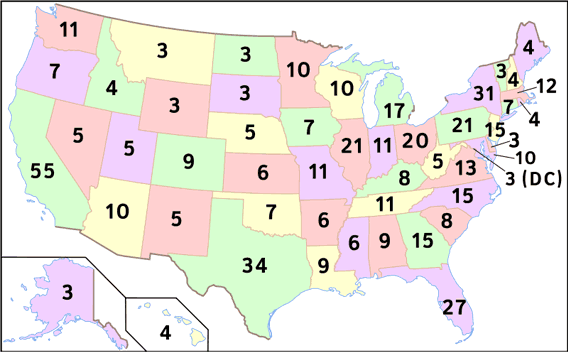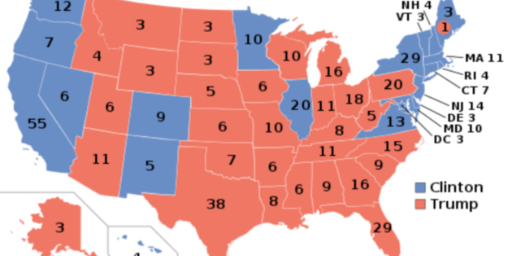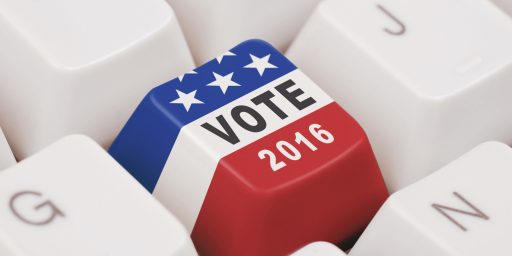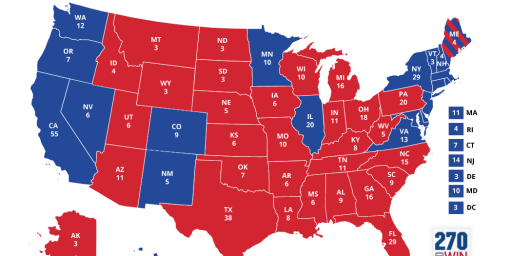Electoral College Fantasies
No, the EC is not going to elect Clinton.
 In various places I am seeing a lot of fantasizing about what the electoral college will do when the official votes for the president are cast next month. These scenarios are being spun primarily from opponents of Donald Trump who are, in my opinion, in denial about how the EC functions and what types of behaviors we could reasonable expect from the electors. A representative example was just published in WaPo by Harvard Professor (and briefly presidential candidate) Lawrence Lessig: The Constitution lets the electoral college choose the winner. They should choose Clinton.
In various places I am seeing a lot of fantasizing about what the electoral college will do when the official votes for the president are cast next month. These scenarios are being spun primarily from opponents of Donald Trump who are, in my opinion, in denial about how the EC functions and what types of behaviors we could reasonable expect from the electors. A representative example was just published in WaPo by Harvard Professor (and briefly presidential candidate) Lawrence Lessig: The Constitution lets the electoral college choose the winner. They should choose Clinton.
Lessig argues:
Many think we should abolish the electoral college. I’m not convinced that we should. Properly understood, the electors can serve an important function. What if the people elect a Manchurian candidate? Or a child rapist? What if evidence of massive fraud pervades a close election? It is a useful thing to have a body confirm the results of a democratic election — so long as that body exercises its power reflectively and conservatively. Rarely — if ever — should it veto the people’s choice. And if it does, it needs a very good reason.
So, do the electors in 2016 have such a reason?
…if the electoral college is to control who becomes our president, we should take it seriously by understanding its purpose precisely. It is not meant to deny a reasonable judgment by the people. It is meant to be a circuit breaker — just in case the people go crazy.
This is problematic on two levels.
First, it is projecting a lot more onto the design than is reasonable if we look at the actual way the institution has functioned over the years.
Second, it ignores the way that the electors are chosen–a process that creates a great deal of constraint on potential outcomes.
On the first point I have noted on multiple occasions that the electoral college does not function the way the Framers thought it would (see here, here, and most recently here). In the context of Lessig’s argument the assumption that the electors would start behaving in some sort of deliberative manner , instead of as messengers conveying their state’s preference, requires assuming that the institution will function in a way that it never actually did. The first two presidential vote were all about Washington. Starting with 1800 the electors functioned more like political operatives than wise delegates in deliberation mode, and it didn’t take all that long before they became pure messengers. Lessig (and others) who see the potentiality of the electoral college acting in some independent fashion to select the president is asking for the revival of something that never existed save in Alexander Hamilton’s musings in the Federalist Papers. Even then the notion that they would be some kind of “circuit breaker” against foolish popular choices is not really what Hamilton described or that the framers of the EC envisioned. If anything, they never saw as significant a role of the popular vote at the state level as we currently have vis-à-vis the electoral college.
Institutions do not typically take on whole new behavioral patterns unless there is some substantial shock to a system or if the participants in a given process have some deep agreement on changing that process for whatever reason. While I understand that many think of the election of Trump as a major shock to the system, the reality is that that a huge chunk of the electorate found him wholly acceptable as a candidate (and as a president). As such, the notion that a couple of weeks of hearing ”President-elect Trump” is enough to radically changes the minds of those who were willing to vote for him after over a year of campaigning and substantial media exposure strains credulity.
On the second point, there seems to be a lot of denial about the composition of the electoral college and, specifically, the importance of the selection process of the electors. Note that in each state the parties select a slate of electors in advance of the popular vote and it is for that slate that we, the voters, vote on election day. This is because the states long ago, as is their constitutional prerogative, decided that the selection of electors would come via the popular vote (and not via selection by state legislators, as was the case in some states early on). But it cannot be stressed enough that the selection of the slates is a highly partisan process. One gets to be an elector only if one is a party loyalist: a donor, an elected official at the state or local level, some kind of party functionary, etc. We are not electing independent actors who see their role as deliberators, but rather we are electing party loyalists who are looking forward to enthusiastically casting a ballot for their party’s nominee. (Yes, there are exceptions to this description, but they are rare–even the unenthusiastic see their role are messenger, not independent voter).
Rules and processes matter. The process to name an elector is the combination of a party level choice coupled with a partisan vote of the public. This produces a party loyalists pretty much by definition. Yes, there can be faithless electors, but the likelihood that the type of persons chosen by this process would become defectors this late in the process is slim to none. Clinton would need 38 faithless electors to switch to get to 270 (and to lose no votes in the process). I cannot see a reasonable scenario in which this would happen. Fair Vote has a great run-down of faithless electors:
Since the founding of the Electoral College, there have been 157 faithless electors. 71 of these votes were changed because the original candidate died before the day on which the Electoral College cast its votes. Three of the votes were not cast at all as three electors chose to abstain from casting their electoral vote for any candidate. The other 82 electoral votes were changed on the personal initiative of the elector.
That is out of thousands and thousands of electoral votes. More significant than the raw numbers, the last time there was more than one faithless elector was over a century ago: 1912 (and that was due to the death of a candidate). 1872 saw 63 faithless electors, but again the death of the candidate was the reason. If we go back to the very early (pre-Civil War) era we see more examples of politically motivated votes, but that was before the institutional norms of the electoral college had been well established. So to assume that all of a sudden, in the context of what in many ways was a normal election* we would see massive defections is unreasonable. And keep in mind, we have never had any election turn on faithless electors. As such, what Lessig and others are arguing for is utterly unprecedented.
As I have said in various places over the last couple of weeks: the political atmosphere that would induce the electoral college to behave wildly outside of its norms is a political atmosphere in which Trump never could have won the electoral college in the first place. We have to remember: ~62.1 million voters considered Trump to be an acceptable president. 306 of the most loyal of those 62.1 million get to cast the constitutional vote for him in December. Yes, a lot of people (myself included) think that Trump could be an historically disastrous president. And yes, a lot of people (myself included) are still trying to comprehend how 62.1 million of my fellow citizens can’t see the potential problems of a Trump presidency. But to assume that somehow that view is going to influence 38 electors to change their minds is, in my informed opinion, a fantasy. It is motivated thinking. It is a wish.
If Trump was truly so unacceptable that he would produce an unprecedented response from the electoral college I believe that he would have therefore been unacceptable enough that he never could have won the electoral vote in the first place. For reasons that we are still trying to fully understand, he was able to win in states that had been solidly Democratic in the past (PA, WI, and MI). He was considered sufficiently acceptable in those (and other) places to win the electoral vote. In other words, while Lessig and many opponents of Trump may think that “the people [have gone] crazy” in electing Trump, ~47% of the voting public don’t think they went crazy, nor will the Trump electors think so.
Again, the punchline of this post is this: the process to select the electors is such that it produces party loyalists who see their jobs as messengers for their states. The process they participate in is not deliberative, it is depositive. Further, the number of defections needed is historic in proportions.
I am a long-time critic of the electoral college. I think it is an artifact of a political compromise that is not defensible in the current era (and would not be chosen if we were starting out now). Further, I consider it a failed institution in the sense that it has never functioned as designed. I also think it is a result of being an early adopter of representative government (the framers neither knew their options nor understood the full implications of their choices). Even the argument that it balances the power of states (which I am not convinced by in 2016) falls apart when we look at a) the fact the ratio of largest to smallest has grown considerably since 1789, and b) the fact that the states added after 1789 were not drawn in a way that really took into consideration the ratios of population to physical space. We did not go through a complex process to determine how states would function as representational units, rather we added states in a fairly ad hoc process that really did not take these notions into consideration.
In general, all appeals to original intent, whether it be to defend the electoral college or, in Lessig’s case, to induce unprecedented behavior from that institution, are fool’s errands. (I do accept, however, that we have it and it is unlikely to be going away).
Is it impossible that the electoral college would vote for someone other than Trump? Well, I suppose that any activity that involves human beings has to be left open for any number of potential outcomes, but the probability of such an outcome strikes me as so low that it might as well be impossible. After all, it is possible that when Paul Ryan talks about repealing and replacing Obamacare he will eventually settle on a single-payer system. After all, there is nothing that stops the Congress from voting in such a system, but who wants to take those odds?
—
*Trump was an unusual candidate, and is likely to be a very unusual president. But when all was said and done, the election itself was not that strange in terms of process and voter behavior. Indeed, the fact that so many Republicans did not see Trump as unusual led to the outcome we have.






I think this article makes it less a fantasy, and more a legal requirement
https://thinkprogress.org/electoral-college-trump-top-lawyers-8a8b6e0ca916?gi=b86a0768a9fa
In short, this provides a valid reason why Mr. Trump should not be given the presidency.
And if he does, and then vows to uphold the laws when sworn in, then he is immediately impeachable for not following the requirements expressly specified in the Constitution, and steps taken to remove him from office.
@Liberal Capitalist: Impeachment and removal is inherently a political process.
The question one has to ask is: what are the odds a Republican House of Representatives will vote to impeach a Republican President?
I will allow that if the GOP were to actually impeach him, then removal would be likely than not, but it will take more than what we know for the House to impeach.
Everyone seems to be forgetting that the Republicans nominated him and overwhelmingly voted for him. That the last couple of weeks is enough for them to impeach is pure fantasy. He is not even in office yet.
I would add that if there was any time where there was a case for this sort of scenario happening, it was the 2000 election. That was because (a) not only did Gore win the national popular vote, but he lost the EC under very questionable circumstances (b) changing the outcome would only have required three electors to flip.
At the time Gore issued a public statement urging GOP electors not to defect, and claiming that he would not accept the results if they did somehow flip the election to him. (He probably did not in fact have the authority to reject that sort of outcome once it occurred, of course. He could have resigned, but then the consequence I assume would have been handing the presidency to Joe Lieberman; there would probably have been no way to give it back to Bush in that scenario. But the importance of Gore’s statement was that he was sending a strong signal to GOP electors not to bring about that situation.) As it stands, there was one faithless elector that year–it was a Democrat who declined to vote for Gore.
If the scenario was unlikely in 2000, there’s no reason to think it would be substantially more likely now, with a distance of 38 electors rather than simply 3, and with state results that (despite the questions raised by those computer scientists) so far looks to be legit. And this is from a party that never bothered to dispose of Trump during the many, many better opportunities they had to do so previously, including crucially at the GOP convention–which would have been a major violation of norms, but to a much lesser degree than the scenario outlined here.
@Steven L. Taylor:
The question there is simply one of expedience. If he goes along with what House Republicans (who see themselves as anointed rather than elected) want, then all well and good. If he doesn’t, his replacement most definitely would and there are a host of convenient grounds on which to impeach and remove him. There aren’t enough sane Republicans left in the House to stop it.
The bigger question, of course, is what Senate Democrats would do.
@Steven L. Taylor I agree with both this comment and the OP. I have, however, made a bet with a friend that Trump will not serve out his term. There are a lot of ways this could happen. He could just get so bored and frustrated that he will quit. He could be removed. He could have a heart attack – the office is known for the stress level. Even if he hangs out in a cocoon in Trump Tower, you know he’s going to be prowling the internet for all the bad things people are saying about him.
Any of these scenarios we are in for hard times and tough choices.
The Republicans didn’t vote on Obamacare a bazillion times because they expected to repeal the law when their efforts were just one presidential veto away from defeat.
The Republicans didn’t hold numerous hearings about Benghazi because they thought that they would find something new.
The Republicans didn’t lead or allow the birther movement to fester because there was a legitimate case to be made that Barack Obama was born anywhere outside the United States (unlike Ted Cruz, who obviously was.)
The Republicans do these things so that they can maintain a constant attack on Democrats. These votes, hearings and various tirades are opportunities to keep complaining, which is a tactic that is meant to kill the Democrats with a death of a thousand cuts.
The Republicans do not care that the Democrats scoff and mock what appear to be Don Quixote tactics or something worse. No, the GOP does these things in order to stir up the GOP base, and is utterly indifferent about what others think.
I seriously doubt that anyone expects this effort to change who is president. (Clinton is not going to get electoral votes from Republicans that get her to 270, so the best case scenario is that a Republican-majority House will choose the next president. You can guess who that would be.)
No, the point is to keep complaining and challenging Trump’s legitimacy as president. I applaud anything that can achieve that goal, including this.
They better vote against Trump or else the OTB commenter crybabies will just literally flood their bedding with pee and tears – but hold tight to your dreams little bedwetters:-)
@Kylopod:
I concur. 2000 was in the context of a much closer EV and with a controversial SCOTUS decision in the mix. Flipping 3 ended up being impossible (and there were some attempts to get them to flip). Flipping 38 strikes me an insurmountable.
@HarvardLaw92: Impeaching and removing a president would be a huge blow to a party, even if that party was having internal difficulties. It would take something truly dramatic for that to happen–well beyond anything that has happened, or that is likely to happen.
And really, the odds are quite good that Trump will sign whatever Congress sends him, so what would be the motivation to remove him in that context?
@Steven L. Taylor:
I know the guy. He likes being liked. Ryan sends him voucherizing Medicare and, well …
@HarvardLaw92: We’ll see. Note that a lot of his supporters will actually be hurt by many of his proposals and yet they still like him.
@HarvardLaw92:
Yes, that explains why Trump stood on that GOP debate stage and called the Iraq War a mistake and held George W. Bush responsible for it and not preventing the 9/11 attacks. I’m sure that was also why Trump declined to join in on the transgender bathroom craze on the right. Seriously, if there’s one thing that was made crystal clear by his campaign it’s that Donald Trump is a compulsive people-pleaser.
Some folks have a lot of their self-worth tied up in denigrating Donald Trump. There’s no way that could possibly backfire on them.
Mike
@bandit:
You just crapped in your pants again 😀
@Steven L. Taylor:
Speaking of which:
Can anyone tell me why I should empathize with this dumbass, who probably voted for Trump because she wanted a white supremacist in the White House?
I agree, btw, that the electors aren’t going to flip and probably won’t flip even with the proverbial dead girl/live boy scenario.( Which leads to the question of why do we continue with this toothless institution?)
I agree with PCh101. Let’s pull out all the stops and try all we can to delegitimize this turd of a Presidential-elect.
It’s better to do SOMETHING, than to wring our hands in impotence and do nothing.
@MBunge: There are some interesting ways that Mr Trump differs from the stereotypical Fox-viewing RWNJ. He specifically said that Caitlyn Jenner could ‘use whatever bathroom she wanted’ for example. If one were of the Candide level of optimism it would be possible to see his dominance in the R-party as a way of introducing some modernity (or more properly — urbanity) to that side of the circus.
I bet you are not that optimistic. I know I’m not. The overwhelming consensus seems to be that he belongs to the side that praises him most effusively. That would be the congressional Republicans unless we all miss our guesses badly.
And what’s this ‘neo-liberalism’ business? Don’t recall your answering that question on another threat. A friend of mine (a Jill Stein voter) splashes that term around a good bit as a way of explaining how there’s really no difference between Sec’ty Clinton and Mr Trump.
@stonetools:
Another low Information {slash} low DNA equivalent of “Keep the Government Out of My Medicare!”
@JohnMcC:
“Neo-liberalism” usually means privatizations, deregulation, liberalization of foreign trade, cuts in the welfare state, etc. etc.
@Miguel Madeira:
I suspect that John’s point is that Bunge and others of his ilk throw around terms such as “neoliberal” without knowing what they mean.
Referring to Clinton’s views as neoliberal makes as much sense as claiming that she is a communist. (What does Clinton have in common with the likes of Milton Friedman?) It sounds like something that he read on a blog and is mindlessly regurgitating without understanding it.
@bandit:
On the one hand, a point of constitutional importance is discussed, specifically outlined by the framers of the constitution, for what appears very legitimate reasons both then and as we see now..
On the other hand…
… we hear from the average thought-process of a proud Trump voter.
Jesus wept.
Fancy that—change the President from D to R and Liberals & Democrats sound alot like the Republican poopy heads of the past 8 years.
If you think out republicaning the Republican Party is the way out of the wilderness–good luck. Here’s a novel idea–try out thinking them. That might be hard now because your party’s entire intellectual framework is based on culture wars and labeling sexists, racists, and homophobes.
What does your party do for black Gen Xers and Millennials? And don’t give me that ObamaCare spiel. I wrote here before that ObamaCare mostly benefits white entrepreneurs and sole proprietors and gets a collective Meh from my demographic–I was predictably pilloried by commentators. Guess who didn’t show up at the polls despite the repeal and replace drumbeat by republicans? Black heads of household largely prefer to work jobs than take on the risk of running a business. Most of us are trying to secure stable finances so the younger generations can take a couple of risks and fail without ending up ruined. Health insurance was not the top 3-4 reasons we pulled the lever for Obama.
What are democrats going to do if Trump makes a play for younger black voters by addressing Police Brutality, Mass Incarceration, and capital flight from the inner cities?
In the same way I wrote that open racists emboldened by Trump are going to find out (the hard way) that there’s a new breed of negro living in America–Democrats are going to learn the same lesson. Good bless the Boomer, civil rights era Black voter…..but we ain’t them. Among my peers, even the ones that voted for Clinton, the order of the day is what have you DONE lately for issues UNIQUE to our community. Trump got more black votes than Romney did. I’d expect that trend to continue…especially if Democrats let the Republicans beat them to the punch with legislation that we care about. Democrats have got 2 years to figure it out.
@JohnMcC: Neoliberalism is a political ideology that assumes markets are self-regulating and autonomous, and are a more efficient model upon which to organize a society than public institutions. Government power is therefore to be used for commodifying all aspects of human existence.
You really believe that the man who took out full-page ads denouncing the Central Park Five and who paints a stereotypical/dystopian/false picture of the black community will really bring reform to police brutality and mass incarceration? How optimistic you are…
“WaPo”
Stopped reading here. Anyone who refers to the Washington Post as “WaPo” or “WasPo” is a parrot and a sheep, so I’m sure I’ve heard your opinions before and that none of them are original.
@Jeffrey: Never seen “WasPo”–“WaPo” has been a standard abbreviation on blogs and online conversations for about 14 years now at least.
Its usage is not indicative of anything.
@Jim Brown 32: “What are democrats going to do if Trump makes a play for younger black voters by addressing Police Brutality, Mass Incarceration, and capital flight from the inner cities?”
Personally, stand up and cheer.
But if you’re really worried that this is going to happen, you might want to look into the record of Mr. Jefferson Beauregard Sessions, Trump’s pick for AG. This man wants to go back to throwing people in prison for years for smoking marijuana. He’s not going to be on your side.
@Jim Brown 32: Like @wr I will be pleased (and surprised) if Trump were to seriously address there issues.
Like wr, however, I find it highly, highly unlikely that a Justice Department headed by Sessions will address police misconduct in a serious and productive fashion, nor other civil rights issues. I expect to go backwards on these issue, not forward.
I think some of the problem with the Electoral College count could be mitigated if you remove one of the 100 automatics (2 for each state), that is, each state would get 1, not 2, automatics. Then the count would be based on winning a majority of 488 electors, and smaller states would have less disproportionate influence than they have now.